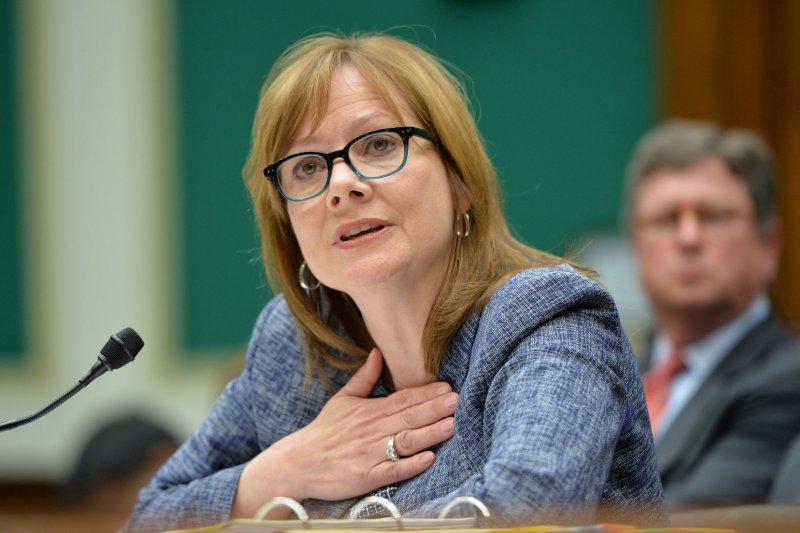1 of 6 | General Motors (GM) CEO Mary Barra testifies during a House Energy and Commerce Committee hearing on the GM ignition switch recall, on Capitol Hill in Washington, D.C. on April 1, 2014. The faulty switch, which can randomly shutoff a moving automobile, is linked to the death of 12 people and injuries of over 30 more. UPI/Kevin Dietsch |
License Photo
WASHINGTON, April 1 (UPI) -- If lawmakers were hoping to learn the "who knew what, when" of a faulty General Motors switch that led to the deaths at least 13 people and the recall of millions of vehicles, they were certainly disappointed by GM CEO Mary Barra's testimony Tuesday.
Facing a barrage of questions from members of the House Committee on Energy Subcommittee on Oversight and Investigations, Barra repeatedly apologized for GM's repeated failure to fix the faulty ignition switches in Chevrolet Cobalts and other cars, but offered little in the way of explanation of why the company failed to act earlier.
“I cannot tell you why it took years for a safety defect to be announced in that program, but I can tell you that we will find out,” she said. “I am deeply sorry.”
The recalls involve nearly 3 million vehicles that contain a part that made it too easy for the car's key to turn in the ignition, moving to "accessory mode" and switching off the engine and preventing airbags from deploying on impact. Drivers complaining of the problem were told their cars are safe to drive as long as they remove "unessential items" from the keychain.
Barra did announce, as expected, the hiring of Jeff Boyer as the new vice president of global vehicle safety. But lawmakers did not seem impressed by the change, which one representative said was filling a gap that should have long ago been filled.
Members of the subcommittee, including chairman Tim Murphy, R-Pa., and full committee chairman Fred Upton, R-Mich., got little in the way of an explanation for why, when the switch was phased out in 2006, the new part was given the same model number as the old, and why the old model was approved, despite not meeting GM's own specifications. They hinted that the automaker was either dangerously reckless, or deliberately hid critical safety information from the public.
“Documents produced to the committee show that both N.H.T.S.A. and G.M. received complaints and data about problems with ignition switches and air bags,” Upton said in his opening remarks. “These complaints go back at least 10 years.”
Throughout the hearing, Barra maintained that she had not been aware of the problem with the switch, despite her many years at GM including as head of product development, purchasing and supply chain, until she took over as CEO in January.
Barra said GM is conducting an internal review, led by former U.S. Attorney Anton Valukas, meant to hash out exactly when people at GM realized they had a potentially deadly problem, and why it was not made public in a recall. She cited the newness of a review in pleading ignorance of many of the basic facts of the case.
But the National Highway Traffic Safety Administration is conducting its own review, led by acting Administrator David Friedman, who laid the blame squarely on the company for damage and lives lost.
“GM had critical information that would have helped identify this defect," Friedman said in his testimony before the subcommittee Tuesday.
Consumers, including the families of those 13 people who GM officially admits were killed in accidents related to the defect switch, simply don't believe the company's line that the cars are safe, and are urging the automaker to tell people to stop driving the recalled cars.
And the lawmakers at Tuesday's hearing seemed skeptical that GM was ready to accept responsibility and institute the necessary changes to prevent such an error again.















